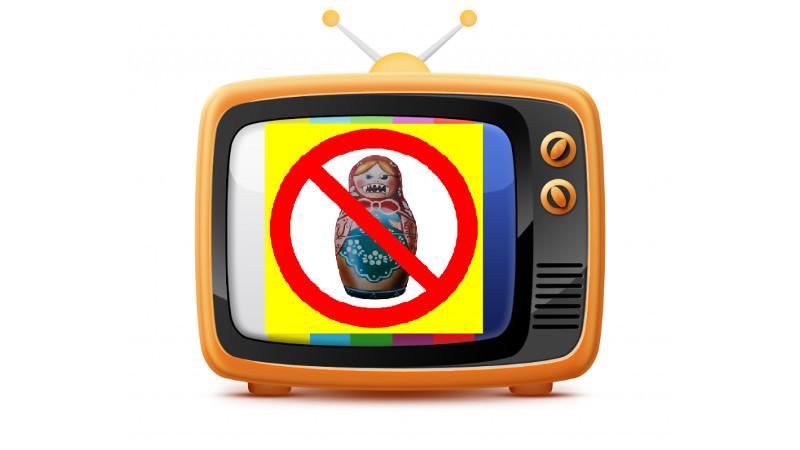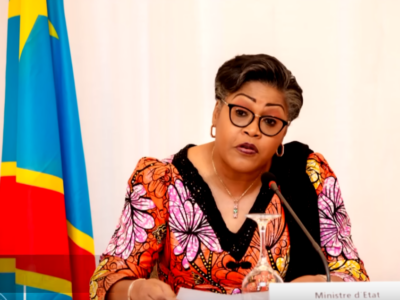
No Russian TV series for Ukrainians… At least not until TV channels find loopholes in the new law. Images mixed by Anna Poludenko-Young
Ukraine has banned a number of Russian TV shows that it claims glorify the Russian government, military, and law enforcement. However, the new law outlining the rules for banning content has run into resistance from national Ukrainian television channels that are already looking for loopholes in the new legislation.
What has been banned
It has been almost two months since the law banning Russian “propagandist” TV shows in Ukraine came into force. A total of 368 TV series and films that allegedly glorify Russian police and military forces have been banned. This might not seem like a big deal, but in reality, the majority of this “made-in-Russia” programming had occupied prime-time slots on major Ukrainian TV channels.
According to Pylyp Illienko, head of the Ukrainian State Film Agency, a cohort of experts reviewed the movies and TV series previously pre-approved for broadcasting in Ukraine. The content that the experts found to contain “propaganda or humiliation on ethnic grounds” was banned.
The new law prohibits movies, television series, documentaries, and even cartoons that “glorify Russian government,” military, law enforcement and other “punitive agencies of the aggressor state” that in some way “justify or legitimize the occupation of any part of Ukrainian territory.”
However, the sanctions for breaking the new law are hardly unbearable for any of the Ukrainian national channels. If a broadcaster is caught cheating, the fine might vary from $600 to $3150 (13,000 to 68,000 UAH), depending on whether it was a first offence or a repeated violation.
Creativity is everything
The new legislation leaves many loopholes for those willing to get a little creative. For example, according to the new law, movies and TV series made in co-production (by two or more countries) and released before January 1, 2014 do not fall under the ban. So, if a movie has a Ukrainian or any other non-Russian production studio mentioned in the credits, such a product is not subject to the new law. Putting an extra line in the credits is easy, while checking if co-production actually occurred is much more difficult.
Some Ukrainian TV channels have already tried using this loophole for their benefit. “Ukraina,” the national channel with the highest ratings (according to data from June 2015), managed to receive a distribution license from the State Film Agency for the Russian TV series “Traces” (След, a CSI look-alike). The trick was that “Ukraina” presented the content as a series with a new title, “Factual Expert Service: International Criminal Investigation Department,” allegedly produced by the channel's own production company in 2015.
“In reality, this is an old TV series, and the channel just added a few scenes here and there in 2015. The actors playing Russian security services officers were sheep-dipped and changed their uniforms so that no insignia or badges were visible,” said Oleksandr Tkachenko, the CEO of rival “1+1 Media” group at a press conference in Kyiv. “Even the name of the agency was changed. Instead of calling it ‘federal,’ as in the original Russian version, they called it ‘factual.’ They want it to look like some sort of a quasi-security agency, but in essence it is very much a Russian TV series.”
A matter of taste
Such “adaptation” is certainly convenient for many major TV channels in Ukraine, since Ukrainian audiences are quite used to consuming Russian media products. According to the research conducted by the civic group Vidsich, 33% of all the television content on Ukrainian channels is made in Ukraine, 29% in Russia, 33% in other countries, and 5% are older products made during the time of the USSR.
Now that Ukrainian TV channels are faced with having to find a replacement for “made-in-Russia” content, some of them are starting to look at Western markets, while others are looking to Asian products, such as shows from South Korea. Television critics, however, warn that Ukrainian audiences are so accustomed to the Eastern European production values of their favorite shows that new cultural tropes and unfamiliar story lines most likely “won’t work.”








4 comments
Very good on the Ukrainian government, soon you will have your population 100% under your control. Definately smells like freedom to me..
First, it’s “definitely”, not “definately.”
Second, only Russian propaganda shows are banned in Ukraine.
Third, some content, for example, child pornography or propaganda of terrorism, is banned in Western countries, too. By the way, how do you understand freedom? A possibility to do all you want, including sleeping with your own sister?
Maybe you should reread the article, as for my spelling..big deal…I do like the fact that you compare child pornography and pro terrorism to shows that resemble CSI though. As for my sister, shes married.
http://www.msn.com/en-ca/news/world/russia-plans-to-burn-foreign-cheese/ar-AAdzrUv
That’s what a good patriot has to do! Instead of giving it to people in need, just burn it.